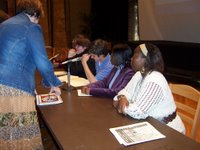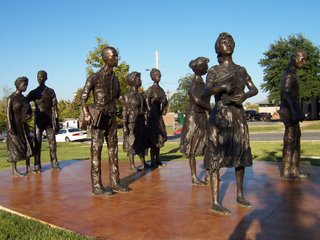
 Forty-nine years later ...
Forty-nine years later ...I wasn't prepared for finding these larger than life-sized bronze statues honoring the 9 courageous black students who -- in 1957 -- braved the forces of segregation, the Governor of Arkansas and his State Guard, and dared to enroll in Little Rock's Central High School as the first black students to try. The figures stand tall on a mound beside one of the state buildings at the Capitol. Below these figures are plaques with words of wisdom by each.
Experiencing the sight of this wondrous tribute less than 24 hours after being in the audience at Arkansas University (the site of the National Women's History Project Conference), where five young students combined to present a description of their memory project. Two of the five were African American girls, one was young girl who was born in Zimbabwe but raised in the US, and the remaining two were teenage white boys. Together they are creating and maintaining a website devoted to the memory of the events of 1957 that resulted in the closing of the schools in Little Rock for two years. (I hadn't known about that.)
Their website is known as the Little Rock Central High Memory Project. I'll look up the website and list it here when there is time to do so.
The sensitivity with which these young people explored their subject with us was emotional for us all. They had each interviewed their parents and grandparents about those events as well as neighbors and friends. Fifty years later and through great social turmoil, minds and behaviors have softened and changed dramatically. One of the white youngsters spoke of his mother sharing with him the fact that while still in school she had had an deep friendship with an African American male classmate. She had yielded to the pressure of the southern context in which they lived and they'd parted at some point in the relationship. She married his father and life went on. It was a dramatic revelation for a mother to make to her son, but was indicative of the kinds of revelations that have come from the memory project.
I thought about those kids we'd heard the day before as Lucy and I visited the monument. I thought about Minniejean Tricky who also made a presentation and who was one of the 1957 enrollees who had suffered the awfulness and who had been eventually expelled for spilling a bowl of chili on one of her tormentors in the cafeteria. Minniejean is now a grandmother, with a movie of her life now available on DVD. Her beautiful daughter, Spirit (ironically), is now a Park Service Ranger on the staff of the Central High National Park.
I now dream of the day when (with proper funding) we might bring that team of present-day Central High Memory Project kids to a Richmond High School or the East Bay Center for the Performing Arts to interact with our kids who have such difficult challenges to cope with. So many are ill-prepared to cope with the day-to-day hopelessness of their lives here in ths troubled city. What an astounding feat that would be if it could be managed. The only problem is that where the schools in Little Rock are still integrated 50 years after these events that so drastically shaped change, those of the city in which I live have re-segregated so totally that I'm not at all sure that what the Little Rock kids would have to teach us can be heard in our school environment. I am so aware of how much regression has taken place simply because we've not owned our history nor have we invited reconciliation, together, as a community. The National Park -- while it's being co-created by the city and the NPS -- should and will become the vehicle for doing just that, hopefully.
Now I understand the fervor in the voices, and the clasped hands of those Arkansans who gathered together on the lawn of the State House on that the night that the Clintons and the Gores and their young families received word of their winning the right to lead the nation from the White House. I remember how I stood in my living room on the West Coast and cried with them as we all sang and swayed to the strains of "We Shall Overcome." We believed in these youthful leaders. Little Rock has, indeed, overcome, though a closer look might well reveal that there is still some moppin' up to do. But for the most part we should all applaud Arkansas for doing what appears (still) in much of the country -- impossible to achieve.
Now I'll see if I can pull up the website of that remarkable Central High program so that tomorrow I can begin to find ways to bring some of that home ... .
Just maybe ...
Tomorrow I'll need to drive by the Fourth Street park campout against street violence -- to see if they still exist. Then I'll try to get back into my role as community outreach worker for the National Park Service. I'll make a major attempt at incorporating the experiences of the past three days in a way that will continue to give meaning to my days and purpose to my life.
Then I'll get back to finding some way to get that Faustian bargain going that will grant me another five or so years of wholeness and sanity.
But if not ... .
So be it.
Photo: Five Central High students making a presentation of their Memories Project before the conferees of the National Women's History Project at the University of Arkansas. (Click to enlarge thumbnails.)
No comments:
Post a Comment